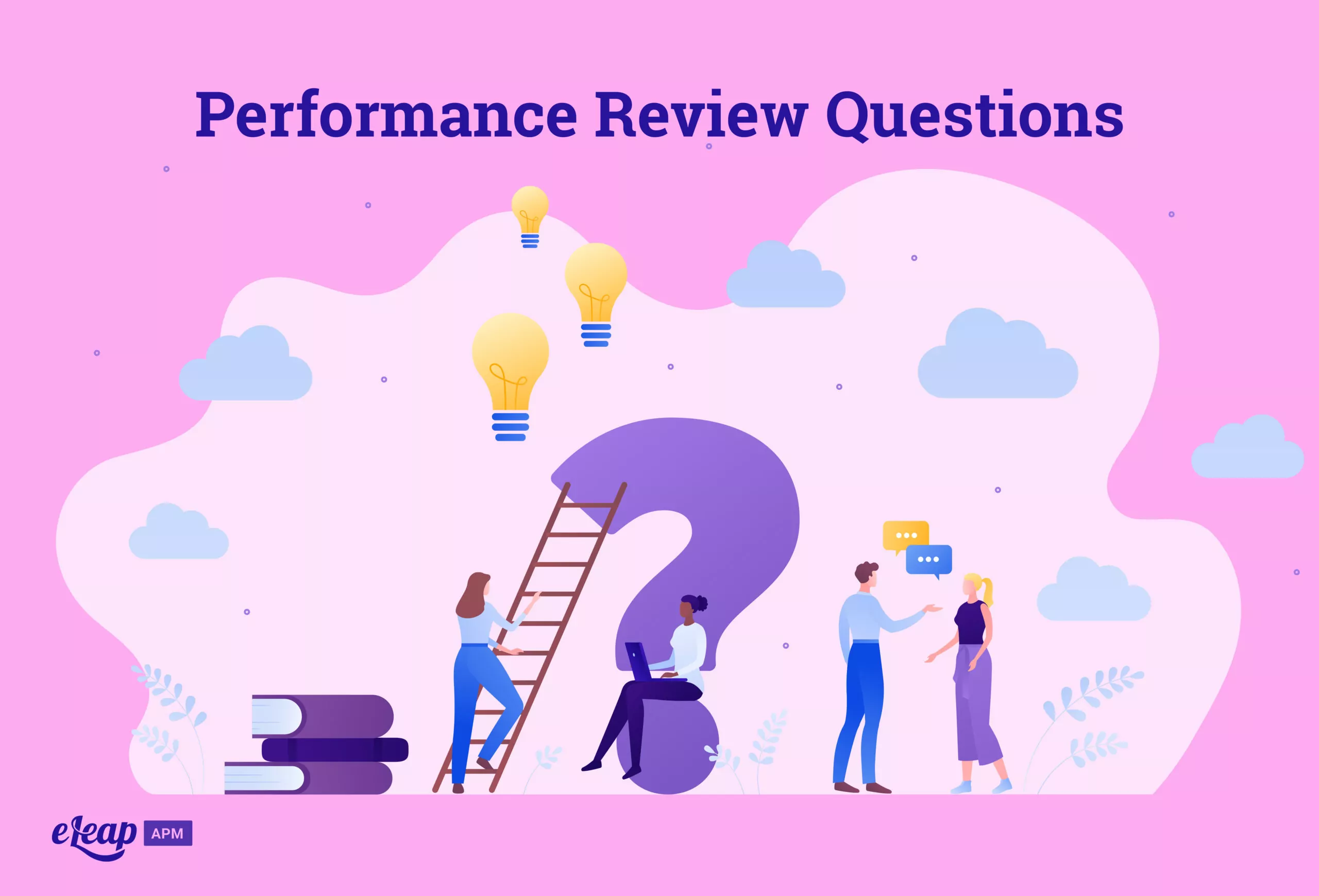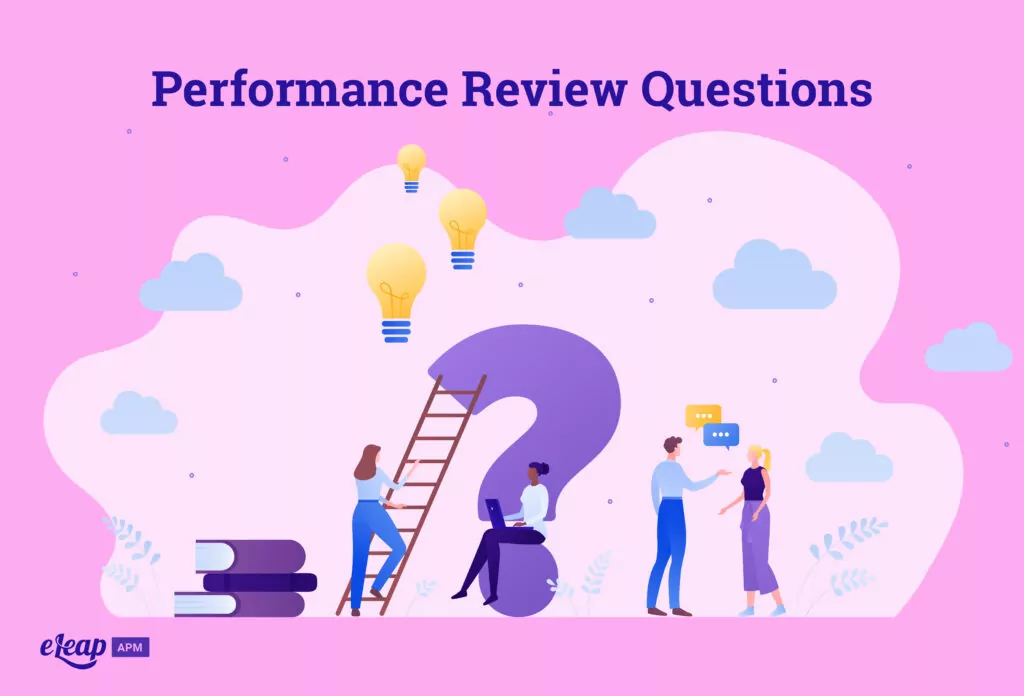Performance Review Questions
Know What to Ask In a Performance Review

For all the stress they cause managers and employees, performance reviews are an important part of a business’s performance management. They help a company’s HR department gather information on how well employees perform. When done well, review cycles help to find the top workers, identify up-and-coming talent, weed out any underperformers, reward the good and the bad, and divvy out responsibilities in the new year where they ought to go. Performance review questions are a spotlight that shows who achieved the company’s goals and who needs more work.

The information gathered from a successful review can affect a business’s goals and guide managers as to where to go next. It also helps identify who deserves promotion, who deserves a raise, and who needs more training or possibly even firing. Because these reviews carry so much weight, the first step in developing an effective review process is to know what you’re going to say. Asking thoughtful, well-worded performance review questions that get to the heart of the objective is key to gaining the information you need.
Therefore, it’s important to understand who you are interviewing, what the objective is, how it can be measured, and what type of performance review questions you should be asking. With those four things in mind, you’ll be building the perfect template for your company.
Know Your Objective
At their core, performance reviews have two purposes – evaluation and feedback. Particularly if you are only conducting occasional performance reviews, evaluation is key to understanding where your employees have succeeded and where they need more work. Evaluations should gauge an employee’s performance over a set period – usually quarterly or annually. This is the information you’ll use to identify whether or not an employee is eligible for a promotion.
Providing feedback is meant to motivate an employee. Giving employees regular feedback celebrates their successes and guides them towards better solutions when they stumble. By the end of an effective performance review, employees should leave knowing what they need to work on and what the company’s expectations are for the coming quarter or year. This objective is about growing your business by growing more professional, more skilled employees.
Who Gets Interviewed and Who Does the Interview?
Depending on how regularly you conduct performance reviews, it might mean interviewing everyone in the company per cycle or breaking it into sections and divisions of the company. Either way, you’ll need to know who you are interviewing to prepare the right information and questions. Someone in HR isn’t likely to receive the same performance review questions as someone in someone in sales.
Then there’s the fact that not all reviews are the same. You have your employee self-evaluation, in which employees fill out their own evaluations and think back on what they’ve achieved in the past, whatever length of time. These are great tools for determining where employees want to go within the company. Then there are peer evaluations. This is a step up from self-evaluations in that they are a little more objective because coworkers review each other. But nothing will be as effective as an in-person review. Those are the questions you should be preparing.
What Does a Performance Review Measure?
Before you can even start coming up with questions, you need to know what you want to measure. Start broad by listing out traits that make an employee a good worker. Then whittle them down to the characteristics most relevant to the job and their responsibilities. There are a few characteristics standard to performance reviews, so be sure to consider these as well:
- Communication/Team Skills – how well does the employee work with others and communicate information to the customer?
- Time Management – Does the employee finish assignments before the deadline? Are they on time to work, and do they not abuse their lunch breaks?
- Leadership Skills – Does the employee show signs of leadership in how they manage other coworkers? Are they motivational and fair?
- Problem-Solving Skills – How creative is the employee when it comes to developing novel solutions to novel problems?
- Impact – Has the employee made a noticeable impact on the company? What have they contributed, and would their absence cause harm to the business?
Of course, depending on their job, some employees may require more specific, more niche questions to really tease out their performance.
How to Word Performance Review Questions
So, you’ve finally reached the point of asking questions. You’ve identified your purpose and who you’re interviewing and worked out what qualities you want to measure, but you’re still not sure what to ask. Remember that you are evaluating but also motivating with feedback. This means that you should be direct in your language without being harsh. Phrase your questions to get straight to the point. For instance:
- What are your greatest strengths?
- What could you improve on?
- What objectives did you achieve in the last quarter?
- What are your goals for the next year?
These get straight to the heart of the matter without leaving room for waffling. There are also a few styles in which you can frame your questions. Have employees look back on their work by asking specifically about the time since their last review. Asking about what they should start doing is a great way to bridge their previous work with the future and guide them toward their goals. Remember to hit on all of the qualities you want to measure by asking specific and measurable questions.
Conclusion
With so much information riding on a successful performance review, knowing exactly what to ask can be just as stressful as taking the review. Knowing who you are interviewing, what your objective is, what characteristics you will measure, and what style of performance review questions to ask can greatly soothe some of that anxiety. The key is to be direct, honest, and guiding in your line of questioning. Taking that into account will make a powerful and effective performance review. Download the ebook “The Skeptics Guide to Performance Management“ and get started on improving your performance management process.